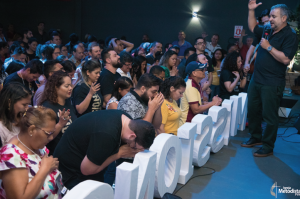 By Luciano Pereira da Silva –
By Luciano Pereira da Silva –
For the sake of context, allow me to describe my own transformation story. I was born in the interior of Brazil. My family was impoverished and dysfunctional, with problems such as violence, alcohol addiction, and illness. As a child I had no future hopes, only thoughts of death. But the Lord had plans for my life. By his grace, I was invited to participate in a Methodist Youth meeting and my life began to change.
I met Jesus and discovered his mission. I experienced a spiritual call to ministry in a meeting with foreign missionaries. They were part of a group connected to Rick Bonfim Ministries. Pastor Rick is a well known Brazilian Methodist evangelist. Upon meeting this group and experiencing my call to ministry, I wanted to connect my life story with missionaries from abroad.
This desire was not without its challenges, however. Protestant missionaries from the United States and Europe have had many religious and political obstacles in establishing and expanding their mission in South America. They brought much hope to me and many people like me. They helped to build churches, schools and Bible societies; to spread the principles of the gospel; and to introduce the Kingdom of God. That work, which began in the 19th century, continues today. We also know, however, that their approach to the mission has often been problematic.
The idea of empowering indigenous leaders within the mission has proven especially challenging for many missionaries, often due to a lack of confidence in delegating leadership positions to them. Even today, this missionary model has several problems that are still prevalent, especially in traditional Protestant churches. Because of a model that often fails to raise up and equip indigenous leaders, a culture of dependency has been created. The result has been a Latin American church culture that has failed to thrive, grow, and live into its potential.
There is a significant contrast between the historical approach of traditional Protestant denominations and that of more recent Pentecostal movements. Pentecostal churches have arisen and grown exponentially in Latin America during the last century. Much of this growth is because they have a soft system of training indigenous workers, both clergy and laity, and they have demonstrated the ability to respond to the needs of common people.
We know that Latin America and the Caribbean continue to have many economic and political problems. But even with the challenges we can change for the better with the help of fully trained and empowered indigenous leaders. Especially with support for the training and deployment of indigenous Latin American mission leaders, we can make a difference for the advancement of the mission.
The generosity of the New Testament church serves as a prime example. “Let me tell you, my dear family, about the grace which God has given to the Macedonian churches. They have been sorely tested by suffering. But the abundance of grace which was given to them, and the depths of poverty they have endured, have overflowed in a wealth of sincere generosity on their part,” writes Paul. “I bear them witness that of their own accord, up to their ability and even beyond their ability, they begged us eagerly to let them have the privilege of sharing in the work of service for God’s people. They didn’t just do what we had hoped; they gave themselves, first to the Lord, and then to us as God willed it” (2 Corinthians 8:1-5).
The CIEMAL (Council of Methodist Evangelical Churches of Latin America and the Caribbean) seeks to empower potential Kingdom leaders through various training programs. The vision is to mobilize, train, and connect laity, clergy, bishops, and local churches to join Jesus in His mission, with the intention of awakening people to help each other with the gifts and talents that the Holy Spirit has given them.
We desire and envision a relationship with agencies and missionaries abroad as follows: the relationship must be cultivated, but from a vision of interdependence, not dependency. The mission’s agenda should never be imposed by outsiders, but rather be contextualized and mutually shared.

Dozens of Brazilians responded to serve in cross-cultural missions during the Amazonas Missions Conference in Porto Velho, Brazil. Held in March 2019, the event brought together churches from the Amazon Conference of the Methodist Church of Brazil. Shown speaking: the Rev. Luciano Pereira Da Silva. Photo courtesy of the Methodist Church of Brazil.
I believe that this is the moment when we need to mobilize workers and awaken them to engage with God’s mission in the world. The mission belongs to God and he has given us the privilege of participating in it. All God’s people are needed, and not just those from traditional sending nations.
The good news is that there exist some special characteristics of Latinos that can make a difference in the mission: their ability to adapt to any circumstance, to learn other languages and cultures, their enthusiasm, and their passion. I believe with all my heart that God is blazing a new path for global mission and he wants to awaken the Latin people to this passion.
We must concentrate our efforts on mobilizing the people of Latin America and the Caribbean and making them aware of this very strong and fundamental call from God. I know that many young people in our countries can see their lives transformed (like mine was) by the power of the gospel and receive the power of the Holy Spirit to serve God in many ways. May God continue to bless us in this way.
Luciano Pereira da Silva is the Secretary-General for CIEMAL, the Council of Evangelical Methodist Churches of Latin America and the Caribbean. He has served as pastor in the Methodist Church of Brazil since 2002. In 2010 he and his family were sent as missionaries to Peru, where for four years he was the National Director of Discipleship. He currently lives in Panama, Central America, where he serves as a local church pastor and church planter. He has authored four books.
Since 2014, TMS Global has collaborated with CIEMAL in mobilizing Latin Americans in 19 countries for mission and ministry. This is the first of a series of articles provided by TMS Global to platform some important voices from the Global South.




0 Comments